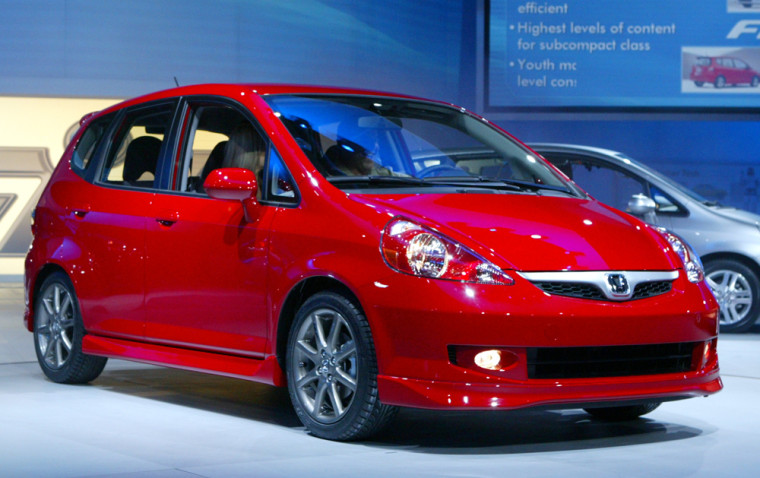Rising gas prices had a mixed impact on U.S. auto sales in April, with some automakers reporting plummeting sales of trucks and sport utility vehicles while others appeared unaffected.
“There’s something rolling around related to fuel economy,” George Pipas, Ford Motor Co.’s U.S. sales analysis manager, said Tuesday, reflecting the wait-and-see attitude many automakers are taking toward fuel prices.
Industrywide, sales slipped 4 percent in April compared to the same month a year ago, when they got a boost from a heavy dose of incentives. The seasonally adjusted sales rate for April, which shows what total sales would be if they remained at the same rate for the entire year, was 16.7 million vehicles, according to Autodata Corp. Automakers sold 17 million vehicles in 2005.
While General Motors Corp. hit pay dirt with its new lineup of SUVs — GMC Yukon sales climbed 36 percent — Ford struggled with a 15 percent decline in SUV and truck sales compared with April 2005. Hyundai Motor Co.’s truck and SUV sales fell 27 percent, but Toyota Motor Corp. and Honda Motor Co. both reported that their light truck sales outpaced car sales.
“In a tough competitive market like this, the victories are model by model, not typically across the board for any particular maker,” said Paul Taylor, chief economist for the National Automobile Dealers Association. Taylor added that the impact of gas prices seems to be slight so far and that consumers seem to be adjusting and are continuing to buy the size of vehicle that best meets their needs.
GM said its April sales fell 11 percent from April 2005, primarily due to a 21 percent decrease in car sales as the company pulled away from the rental car business. GM’s truck and SUV sales were down 2 percent.
Paul Ballew, GM’s executive director of market and industry analysis, said sales to rental and corporate fleets will continue to decline throughout the year as part of the automaker’s restructuring plan. Fleet sales bring in lower margins for automakers and can hurt vehicles’ resale values. Fleet made up 30 percent of GM’s sales in April, down from 32 percent a year ago, Ballew said.
Ford’s April sales fell 7 percent from a year ago, dragged down by a 15 percent drop in sales of trucks and SUVs as consumers turned to more fuel-efficient cars and crossovers. Sales of Ford, Lincoln and Mercury cars rose nearly 11 percent, and the company said sales of its car-based crossover utility vehicles were up 8 percent.
Ford also reported the best monthly sales ever for its hybrid Ford Escape and Mercury Mariner, up 68 percent over last April, after it offered zero-percent financing on the vehicles. Pipas said the deal, which will remain in effect through July 1, helps erase the $3,000 premium buyers would otherwise pay for a hybrid.
But sales of trucks and SUVs were disappointing. Sales of the Ford Explorer SUV continued their free fall, plummeting 42 percent, while Ford’s best-selling F-Series pickups saw a surprising 9 percent decline. Pipas said Ford saw some payback from March, when pickup sales were especially strong, but he also suspects some F-Series buyers were sitting back and waiting for gas prices to subside.
“We don’t see this buyer leaving the segment to the extent that they have the full-size SUV market, but fuel prices probably had something to do with the F-Series result this month,” Pipas said.
SUV sales also were down at Toyota, but sales of pickups and crossovers were up, helping Toyota achieve its best U.S. sales month ever. Overall light truck sales rose 7 percent for the month, outpacing Toyota’s 3 percent increase in car sales and helping Toyota achieve a 5 percent sales gain for the month.
Honda said its sales rose 3 percent. Car sales were flat at the Japanese automaker, but truck and SUV sales were up 5 percent thanks to record-setting sales for the Ridgeline pickup, Odyssey minivan and other models.
Dick Colliver, Honda’s executive vice president, said Honda’s trucks and SUVs are among the most fuel-efficient in their segment, which helped boost sales.
“We’re not seeing a shift away from light trucks right now, but we are seeing customers make purchase decisions based on fuel economy,” Colliver said in a statement.
Car sales shot up 32 percent at DaimlerChrysler AG’s Chrysler Group thanks to the new Dodge Caliber, which replaced the Neon sedan. But truck and SUV sales were down 19 percent, resulting in an 8 percent decline in overall sales. Chrysler came out swinging to reverse the trend, announcing zero-percent financing on selected minivans, trucks and SUVs through July 5.
“Gas prices and interest rates are challenging consumers’ spending habits and affecting everything from groceries to household goods to some sectors of automobile sales,” said Gary Dilts, Chrysler’s senior vice president of sales.
Nissan Motor Co. said its light truck sales were down 3 percent for the month, but its car sales dropped even further, by 7 percent. Nissan’s overall sales fell 5 percent in April.
Hyundai’s sales increased only slightly for the month, with a 10 percent increase in car sales helping to offset a 27 percent drop for light trucks. Even with that drop, the South Korean automaker said its U.S. sales set an April record.
The Associated Press reports unadjusted figures, calculating the percentage change in the total number of vehicles sold in one month compared with the same month a year earlier. Some automakers report percentages that are adjusted for the number of sales days in a month.
